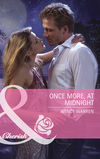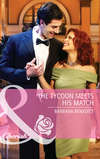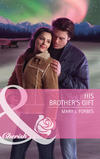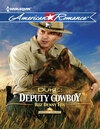Читать книгу: «More Than a Memory»
More Than a Memory
Roz Denny Fox
MILLS & BOON
Before you start reading, why not sign up?
Thank you for downloading this Mills & Boon book. If you want to hear about exclusive discounts, special offers and competitions, sign up to our email newsletter today!
Or simply visit
Mills & Boon emails are completely free to receive and you can unsubscribe at any time via the link in any email we send you.
Table of Contents
Cover
Title Page
About the Author
Chapter One
Chapter Two
Chapter Three
Chapter Four
Chapter Five
Chapter Six
Chapter Seven
Chapter Eight
Chapter Nine
Chapter Ten
Chapter Eleven
Copyright
Roz Denny Fox has been a RITA® Award finalist and has placed in a number of other contests; her books have also appeared on the Waldenbooks bestseller list. She’s happy to have received her twenty-five-book pin and would one day love to get the pin for fifty books. Roz currently resides in Tucson, Arizona, with her husband, Denny. They have two daughters.
Chapter One
JO CARROLL TAPED UP the last of her moving boxes and set it by the door. Only her mother’s room remained for her to deal with. Jo had put it off until last. It didn’t seem possible that a month had passed since Sharon Drake had been laid to rest next to Jo’s dad, Joseph, in the cemetery not far from the apartment she and Jo had shared. Sharon’s death had been as unexpected as the car-train accident that had claimed Joe Drake’s life seven years earlier.
One morning Sharon woke up complaining of a bad headache. In the blink of an eye she’d collapsed—and was gone before the paramedics arrived. The doctors told Jo it was a brain aneurysm, and she tried to take comfort in the knowledge that her mother hadn’t suffered.
Now Jo was on her own. She wasn’t a child. At twenty-five she could take care of herself. Since her dad’s death, an accident that Jo herself had been lucky to survive, her life had revolved around her career as a concert violinist.
Hesitating at the threshold of her mother’s bedroom, Jo nervously brushed her palms down her denim jeans. Sharon had been an intensely private woman, and a controlling one. Jo had put off this task as long as she could, but she’d crunched the numbers and she knew that moving was an economic necessity. Her monthly stipend as lead violinist with the Boston Philharmonic Orchestra, and the little she earned working odd shifts at a coffeehouse, wouldn’t cover the rent on this two-bedroom unit in a renovated brownstone on Commonwealth Avenue.
Her mother had insisted they needed to live where they could rub elbows with symphony patrons who could help advance Jo’s career. But Jo wondered how her mom had made ends meet.
Determined to be done with it, she opened an empty box and started sorting her mother’s belongings. She set aside a cameo pin to save. Jo planned to donate the rest to a women’s shelter. The lack of anything of real value drove home the sacrifices her mother had been willing to make for Jo’s profession.
Guilt welled up as she folded a worn, blue crepe dress—the last piece of clothing in the closet. Now, a final check to make sure she’d gotten everything and she’d be ready to call in the movers.
Wait! What was that on the top shelf? Whatever it was had been stuck behind a winter bedspread. She had to stretch, but Jo managed to get down a wooden box. Not too heavy, but it was wedged in tight. Her dad’s name was carved on the lid. Jo’s hands shook. She had no memories of him. The box was cedar, she realized as she sank to her knees and opened the lid, releasing a pungent scent.
Inside she found books and papers. High-school yearbooks along with news clippings and gilt-edged certificates.
Jo felt momentarily disappointed. She’d been hoping for a will or an insurance policy. But this was strange. The yearbooks were from a high school in Tennessee. White Oak Valley High. Jo didn’t know anyone in Tennessee.
As she inspected a couple of the awards, a knot formed in her stomach. The name Colleen Drake was stenciled on each. All were first- and second-place wins from the Smoky Mountain Music Festival.
Breathing became difficult as Jo sifted through two dozen yellowed newspaper articles. A girl pictured in one bore an uncanny resemblance to her own few childhood photographs, which she’d already packed. Here was this Colleen Drake again. A gifted violinist with the same last name as Joe’s family…Fumbling, Jo dropped the clippings. Out slithered a thin gold chain. Hanging from it was some kind of pendant—a gold oak leaf. The leaf was inscribed on the back, Jo saw as she turned it over. Ornate script read Forever Love. Under the words were entwined letters that could be a G and a C, or perhaps two Gs.
Jo curled her fingers around the pendant. All the items in the box were puzzling. Actually they were a little frightening, she thought, absently tracing a threeinch scar along her hairline. A throbbing pain grew after she opened one yearbook and paged through class photographs. She would’ve been a high-school sophomore that year. There was her smile on the face of a stranger named Colleen Drake. Cold prickles ran up Jo’s spine. Her first inclination was to put everything back in the box and pretend she’d never found it.
Curiosity made her open the second book—her junior year. That picture of Colleen Drake resembled her uncannily. It could almost be her—except she never wore her hair pulled back away from her face the way it was in this photo. And Jo’s birth name had been Drake, too, until she’d changed it for professional reasons.
The question was unavoidable. Who was Colleen Drake? Could this be her? Lights flashed behind Jo’s eyes, warning of an impending migraine. She fended it off by sheer will. A cousin—maybe this was a cousin.
A spot in the third yearbook where a graduation photo should have been was blank. But Colleen Drake’s name was typed there along with credits listing activities such as track, band and girls’ chorus. What had happened to the girl with her face?
Unable to think clearly for the pounding in her skull, Jo cradled her head in her hands. Neatly layered rustred hair fell forward, veiling the damning evidence.
After a minute, she felt calm enough to begin reviewing what she did know. There wasn’t much. The severe injuries she’d sustained in the accident that had killed her father had erased her memory. When she woke up in the hospital following surgery, she’d panicked at her inability to recall anything. But then her mother had appeared at her side. Sharon patiently sat by Jo’s bedside and painstakingly reconstructed her past, one story at a time. Some details bubbled up now. According to Sharon, Jo had led a privileged childhood, attending private schools and studying with music tutors. Master violinists. Sharon repeated these stories so often Jo felt as if she remembered living them. Everyone at the hospital considered it a miracle that she’d retained the ability to play her violin. They consulted doctor after doctor who’d all said that sometimes it happened like that following a head trauma. Maybe her memories would return, but maybe they wouldn’t.
Why—why would her mother lie to her? Why hadn’t she said anything about this cousin or whoever she was? After all, she’d kept these yearbooks…Fear crept in.Who was left to confirm her mom’s accounts of her history?
Scrambling to her feet, Jo found her cell phone and punched in Jerrold Cleary’s number with shaking fingers. A longtime patron of Boston’s symphony, Jerrold was Jo’s mentor and her mother’s staunch friend. Jo suspected her mother and Jerrold had a loose romantic relationship, but she had no proof of it, except—
“Jerrold? It’s Jo.” She broke off her erratic thoughts and found herself babbling. “I thought I’d emptied Mother’s closet, but I found a cedar box I think belonged to my dad. This is going to sound bizarre, but…did Mother ever mention me having family? Maybe a cousin, Colleen?” A sigh slid out, but Jerrold’s assurance was a relief. He and her mother often huddled together in the kitchen talking while Jo practiced for six or eight hours every day.
“Not that I know of, Jo,” Jerrold said. “Are you all right? You aren’t making much sense.”
“I know. I’m sorry to have bothered you. I’ll dig deeper.” Jo hastened to say goodbye, but Jerrold cut her off. “You sound funny. I’ll be right over.”
“There’s no need. I’m sure there’s a logical explanation for this stuff. This must be a long-lost cousin from Dad’s side of the family,” she said, trying to believe it. The other possibility was too devastating to consider.
After she’d healed, on a rare outing to a mall, Jo openly envied the young women her age. She’d seen them holding hands and laughing with their handsome boyfriends. Her mother used to hurry her along or divert her attention. Was that significant?
“Don’t come over, Jerrold. I’m about to call the movers. I have everything in the apartment packed.” Except for the items from the cedar box. Jo scowled down at the phone gone dead in her hand.
She didn’t call the movers, but returned to her mother’s bedroom and sat down to read the news clippings.
Lost in her reading, Jo felt her heart race when the outer apartment door opened and Jerrold Cleary called her name. She met him in the empty living room. As a rule, his suits were impeccable, and she’d never seen him with a single iron-gray hair out of place. Today he looked rumpled and irritated. “Whatever crap you’ve unearthed, Jo, it’s better tossed out and forgotten.”
“Better for whom?” Jo never talked back, and the fact that she did now surprised both her and her visitor. Jerrold waved a dismissive hand.
“Better for your career. Your career is everything. You know your mother devoted her life to ensuring your success. I was going to pop by later with this fantastic news, but I think you need a boost now.” Jerrold took a paper from his inner pocket and passed it to Jo. “I’ve finalized arrangements for you to go on the European circuit this summer,” he said, all but preening. “And I negotiated three solos.” He wiggled three fingers under Jo’s nose, as though she might have misunderstood. “The pieces the conductor wants you to do are listed on the back of the schedule. You’ve played them all, but you need to start practicing until every note’s perfect.”
“You aren’t listening. What if I’m not alone? What if I have family somewhere?”
He tapped the schedule she hadn’t glanced at. “This is a huge coup, Jo. It’s just a shame your mother won’t get to see you play Ravel’s ‘Rapsodie Espagnole’ on stage in Spain. Hearing you solo on the European circuit was her lifelong dream. But you know that.”
Jo had difficulty taking in anything Jerrold was saying. And the ambitious itinerary she held might as well have been written in Chinese. “Jerrold, I can’t…go…on this tour.”
“Nonsense. I know violinists,” he stated in his typically pompous way. “You all get cold feet. But you, Jo Carroll, are the most naturally gifted virtuoso I’ve ever had the good fortune to mentor. With dedication I predict you’ll one day be as famous as Itzhak Perlman or Vladimer Spivakov. And as wealthy,” he murmured, straightening his tie. “You, my dear, will be world renowned. My only reward will be to stand in the wings of a sold-out house, watching the audience give my protégée standing ovations.”
“Jerrold, you aren’t getting it.” Jo thrust an award certificate at him. “Look at this. I don’t know if I’m Jo Carroll. Or am I this other musician, Colleen Drake? It’s too much of a coincidence that she looks like me and has the same talent. What if I’m her?”
Jerrold carelessly tore the certificate in half and dropped it. “Jo, you already knowyou’re a Drake. Does the first name really matter? After the accident, Sharon and I decided using her maiden name, Carroll, for your stage name would ensure you privacy. Sharon Carroll would have been famous had she not gotten pregnant with you and been forced to scrap her singing career.”
“Mother used to sing around the house.” Running a hand through her disheveled hair, Jo circled the nearly empty room. “Daddy made acoustic guitars. And fiddles.” She stopped midstride, aghast. “That…all came out of nowhere, Jerrold. Did Daddy make guitars? I swear Mother only ever mentioned his violins. Oh, but I could be way off base. Mother auctioned Daddy’s wood and his tools on eBay after I was released from the hospital.” Jo pressed her aching head to the cool window.
“Stop agonizing, Jo,” Jerrold snapped. “It’s this move and going through your mother’s things. I have no idea why you’re insisting on doing this now when you should be spending every minute practicing for the summer tour.”
“How can you talk about a tour when my life is in shambles?” Jo wadded up the schedule. She shoved the crumpled ball back at him. “I’m not going to Europe. I mean that, Jerrold. I’m going to follow up on what I’ve found. It’s bad enough that I lost my childhood, but this confusion about what I thought I’d restored…” She raked her hair out of her eyes, this time with a noticeably shaking hand.
“Don’t tell me no, you ungrateful little upstart,” Jerrold sputtered, his face an alarming shade of red.
At first Jo recoiled from his outburst. But midtirade she yanked open the door. “I’m not a child, Jerrold, so don’t treat me like one. I know this is all a huge shock, but something just isn’t right.”
“Of course,” he responded smoothly, plainly making an effort to curb his anger. All trace of irritation left his commercially tanned face as he pasted on a poor copy of his earlier smile.
Paying no attention, she said, “Mother gave you a key to our apartment. May I have it, please?”
“The key? Oh, very well.” He handed it over, but only after he straightened the wrinkled tour schedule and pressed it into her free hand. “We’ll get together once you’ve settled into your new studio. The plus side of this move is that it puts you closer to Jordan Hall. When the time comes, after the credits you gain in Europe, you’ll be able to audition with the BSO. I’m very close to booking you three hours a week with a master violinist who used to play with the Vienna Philharmonic. He liked the demo tape of your work. I know you’ll see this as an example of the great opportunities I can give you.”
He sped off, and Jo heard the clatter of his shoes on the stairs before she collected her wits enough to yell, “I’m not changing my mind, Jerrold!” The man ought to realize she couldn’t focus on her work when she had question after question tumbling inside her head and no satisfactory answers.
Why wouldn’t her mother have told her if they had family in Tennessee? Though she strained to remember, the terrible event remained elusive.
Jo assumed there were gaps in the history her mother rebuilt for her after she’d emerged from the coma. Two neurologists and a psychologist agreed she didn’t have retrograde amnesia, but rather dissociative fugue brought on by an intense desire to suppress something she couldn’t bear to face. Still, the accident and everything that came before it had been excised from her memory. And yet it made no sense that her mother would’ve told Jo about her dad’s death and not her cousin’s—if she’d had one. It was even less likely that Jo would’ve grown up privileged in Boston, and a sister in some obscure Tennessee town. A place called White Oak Valley. That simply didn’t make sense.
Logic told her that something was very wrong. But what if she started digging and found a truth so awful she’d wish it had stayed hidden?
She had pills for these migraines, but it had been a while since she’d needed them. She took one and lay down. When the pain eased she began to reflect on the number of times since the accident she’d felt disoriented—as she did now. The only cure was to immerse herself in music. Her violins were all packed, but she tore the box open. Soon the empty third-floor flat echoed with the rich, haunting sounds of Brahms’s “Tragic Overture.”
Jo played until her neck got stiff and the fingers of her left hand felt permanently curved around the violin’s slender neck. But when she finally set down her bow she knew the uncertainty would suffocate her if she allowed it. Whether it destroyed her career or not, she had to get answers.
LESS THAN A WEEK LATER, after consulting a travel agent, Jo pulled her mother’s ten-year-old Subaru off the road in Tennessee at a misty mountain overlook. It had been her original intention to sell the car, but now she was glad she’d kept it. Here she was, less than thirty miles from White Oak Valley.
The bravado that had carried her this far began to falter.
Jo had passed through Sevierville, and Gatlinburg, tourist towns the travel agent had circled on the map. The agent had pointed out that even at the end of May it was still early for the bulk of tourists who flocked to the area for fishing and local crafts.
Resting her arms on a waist-high guardrail, Jo glanced down andwas able to identify the silvery thread of a river far below—probably the same one she’d crossed an hour back. The view across the wide valley was partially shrouded by a lavender-gray haze that left Jo oddly breathless. The scene seemed vaguely familiar, as if she’d seen it before—perhaps in a movie or a magazine.
Shivering, she rubbed her upper arms. It was cooler here in the mountains than it had been when she left Boston. Frustrated that nothing had brought back any concrete memories yet, Jo returned to the Subaru, donned a cardigan and drove on to the tiny hamlet of White Oak Valley.
Beautiful full-blooming dogwood trees lined the main business street that seemed to bisect the small community. Most of these tired buildings had no doubt seen generations of residents come and go: the same families who still lived in the rambling older homes almost hidden by the towering trees.
White Oak Valley lay off the well-traveled tourist highway, and therefore didn’t seem to boast the chain restaurants and motels Jo had passed in Gatlinburg. That town’s claim to fame was a shrine honoring a TV show, The Dukes of Hazzard. Jo had never seen it; her mother always said TV wasted time. So, Jo gassed up the Subaru, but didn’t tour Cooter’s Place as the young station attendant suggested.
After driving from one end of White Oak Valley to the other, disappointment skidded through Jo. She’d expected something to trigger a breakthrough. Nothing did.
Her stomach growled. It was two hours past her normal lunchtime, and Jo decided to try a café across from the city park—Mildred’s, according to a weathered sign. Faded lettering on two plate-glass windows advertised sandwiches, soup, chicken and dumplings, and breakfast at any hour. Jo parked in front of an oldfashioned drugstore and walked back to the café. She pushed open a creaky screen door that released the enticing aroma of home cooking. A 1950s-style soda fountain with chrome-and-red-leather stools ran the length of the room, separating a steamy kitchen from a few tables and vinyl upholstered booths, all of which were empty. Freshly cut sweetpeas sat in fruit jars on every table. Overhead, three white fans would do little to cut the heat billowing from the kitchen once summer arrived.
Choosing a booth near the door, Jo helped herself to a menu tucked behind a remote selector for an ancient jukebox that was even now belting out a country song. She paused a minute and paged through the list of tunes, but realized she’d never heard any of them. Her musical repertoire consisted of symphonies by Beethoven, Schumann, Tchaikovsky and other classical artists.
A pregnant waitress about to pop the buttons off her aqua-blue uniform waddled up. “What can I getcha?” she asked, cracking her gum.
“A bowl of corn chowder and tea,” Jo said, thinking that would warm her up. “Anything herbal you have will be fine.”
The waitress turned and hollered toward the kitchen. “Mildred, we got any tea back there ‘cept the sweet tea Esther made up? We got a customer wanting herbal.”
A scrawny older woman, whose age was more apparent because of hair cut short and dyed jet-black, emerged from the kitchen. She took one last puff of her cigarette before crushing the butt in an ashtray next to the cash register.
“We’re plumb out of any but Southern sweet tea until I get to the grocery—Well, now.” The woman broke off and her jaw sagged even before she collided with the gum-chewing waitress. “Lawdy, if this don’t beat all. Everybody thought you was dead, missy.”
A shiver wound up Jo’s spine, and the menu slipped from her hand. “You know me?” she managed to ask.
At first the woman cackled in disbelief. But as Jo struggled to leave the booth, the woman—Mildred—backed away. “Don’t believe in ghosts,” she hissed. It was plain she didn’t intend to say more.
“Please,” Jo implored. “I’m not sure who you think I am. I recently discovered some high-school yearbooks from this town. I came here hoping for…I don’t know…information, I guess.”
“If you ask me, and nobody did, if you are Colleen Drake and you ain’t dead, you’ve got some explaining to do. Not to me, but to poor Garret Logan.”
“L-Logan?” Jo stumbled over the name. She shook her head to clear her thoughts. “I…my mother never mentioned anyone by that name.”
The woman’s top lip curled, and she took up a rag to start swabbing the counter. “No surprise there. With her puttin’ on airs and thinking you and her were better than anybody born in these parts? May the good Lord forgive me for being blunt, but this town and the Logans will be better off if you trot on back to whatever snooty place you been keeping yourself.” Mildred eyed Jo’s linen slacks and her matching purse and sandals, then proceeded to shake another cigarette out of a pack of Marlboros she dug out of her apron pocket. Lighting up, she blew a stream of smoke toward the ceiling.
Jo choked on the smoke. Her head began to throb, and she could hardly breathe. This woman couldn’t have known her mother if she thought Sharon Drake put on airs. Everything she did was to promote Jo’s career.
But it was pointless to argue. Instead, Jo left the café. Making enemies wouldn’t get her anywhere. And there was no question but that Mildred thought Jo owed this Garret Logan, whoever he was, an explanation or something.
Perhaps if she tracked him down he could clear up this mystery and she could be back in Gatlinburg before dark, having had a decent meal in a chain restaurant. If that was putting on airs, she was guilty of it, not her mother.
Reaching her car, Jo hesitated. She ought to ask Mildred where she could locate Garret Logan.
Fortunately, a boy of about twelve or thirteen passed Jo on a bicycle. He darted her a friendly smile, then swerved toward the city park.
“Hey,” she called. “You on the bike. I’m trying to find a man named Logan. Do you know where he is?”
The boy circled back. “Sean just went into the bank.”
“Garret. I’m looking for Garret.”
“I reckon he’d be at the pub.” The boy once again started across the street.
“Thanks, but where’s the pub?” The most she got out of the kid was a thumb jerked at the opposite end of the street. She did remember seeing a tavern almost at the edge of town.
She could’ve walked, but driving gave her a moment to collect herself. She pulled into a graveled lot at the end of a log structure. Jo looked the building over as she locked her car. Neon lettering spilling out of a giant foamy beer mug identified the establishment as Logan’s Pub.
At once a different image flashed before Jo’s eyes, making her blink. In her mind the sign said not Logan’s Pub, but Garret and…someone else’s…Pub. The second name swam, refusing to come into focus. The entire image dissipated in an instant. But it lasted long enough to startle Jo, and her sweaty hand slipped off the heavy oak door.
A plaque nailed at eye level announced live bluegrass music on Friday and Saturday nights. Thankfully that sign didn’t float or change. Still, her stomach fluttered as Jo stepped inside and took a minute to let her eyes adjust to the dim interior.
Suddenly her knees threatened to buckle as she was overwhelmed by a rush of nostalgia she couldn’t explain. A polished bar reflected light from several brewery signs. Her nose wrinkled at the malty smell of beer. As far as she knew, this was the first time she’d ever set foot inside this tavern or any other.
Her eyes skimmed the dark-haired bartender who had his back toward the door as he filled a glass with a dark amber brew. Two other men sat at the farthest end of the bar, deep in conversation. One had a glass of beer and a sandwich in front of him. The other had a sandwich but no beer. Dismissing the men, Jo’s eyes lit on a small empty stage opposite the bar.
Aloud crash had her whipping her head back toward the bar. The bartender had dropped the glass, and a million winking pieces swam across the floor in a river of ale.
GARRET LOGAN HAD HEARD the front door open and close. It was early for the onslaught of the usual afterwork crowd. He finished drawing an ale for the second of two salesmen at the bar before he turned to check on the new customer. When he did, the glass slipped from his hand. He blinked hard, trying to erase the too-real apparition of a woman he’d thought dead for the past seven years. He’d assumed Colleen Drake lay buried in some East-Coast cemetery, along with her father, Joe. And with her, a secret the two of them had never told a soul.
Unable to tear his eyes from the mirage, he whispered a shaky “Colleen? My God, come closer. Let me look at you.” Garret’s brain said he should fill another glass for the waiting salesman. At the very least he needed to clean up the mess. But his boots seemed welded to the worn plank floor as his eyes drank in Colleen’s beautiful features.
She stared at him, her eyebrows drawn together.
“You’re the second person in this town to call me Colleen. Who are you? Do you know me?”
No. She couldn’t be serious. Garret would know Colleen anywhere in spite of the inevitable changes in her appearance—such as the salon-tamed hair that used to curl wildly around his hands each time he tilted her face up for a kiss. This classy woman who gazed at him from several feet away had a degree of sophistication Colleen had lacked. But it could be no one else. Dammit, half his life had been entwined with hers. He’d loved her even longer than that. Loved her with all his heart. And for seven years he’d grieved over her death. It was only in the past year that he’d been able to consider going on without her. It didn’t matter that his large, loving family and host of friends urged him to get on with his life almost daily. Garret’s pain at losing Colleen had been too great. They’d planned to be married as soon as he returned from Ireland.
From deep inside a fog of shock, he watched her come closer. In the same smoky voice he’d never forgotten, she murmured, “May I call someone? Did you cut yourself on the glass?”
The formality of her query shook Garret out of his paralysis. The paralysis was replaced by unreasonable anger. He planted both hands on the bar to steady himself. “Where did you run off to? Why are you back now? What do you want from me?”
A dozen questions swirled in her head, but what came out surprised Jo. “If you don’t mind, I’ll take a sarsaparilla.” Truthfully, she had no idea what she had just requested, other than she thought it was some type of soft drink. She hadn’t ever tasted sarsaparilla. Had she?
Garret didn’t smile but said through clenched teeth, “Why don’t you and I step outside?”
“Why?” Jo’s voice wobbled.
“Because we have an old score to settle.”
“What old score?”
“As if you don’t know. Give me a minute. I’ll get Brian to take over for me here.” Abruptly he turned his back on her, grabbed a mug, filled it to the brim and deposited it in front of his customer, who along with his friend was taking everything in. Too shaken to stay in her presence a moment longer, Garret stiff-armed his way through a door marked Private at the back of the bar.
“Who are you? And who’s Brian?” she asked, raising her voice.
The door swung shut behind him on silent hinges, leaving Jo gaping at the rude man who hadn’t felt the need to share his name.
Бесплатный фрагмент закончился.
Начислим
+10
Покупайте книги и получайте бонусы в Литрес, Читай-городе и Буквоеде.
Участвовать в бонусной программе




























